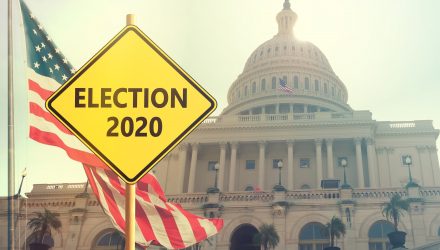Data firm Moody’s Analytics used three different models to determine the results of the 2020 election and thus far, they are predicting that U.S. President Donald Trump will cruise to a second term. The projections are based on the gains in the stock market and the unemployment rate, which, if they remain static, will seal a victory for Trump.
“If the economy a year from now is the same as it is today, or roughly so, then the power of incumbency is strong and Trump’s election odds are very good, particularly if Democrats aren’t enthusiastic and don’t get out to vote,” said Mark Zandi, chief economist at Moody’s Analytics and co-author of the paper along with Dan White, the firm’s director of government consulting and fiscal policy research, and Bernard Yaros, an assistant director and economist. “It’s about turnout.”
All three models used by Moody’s shows that Trump will receive 289 electoral votes based on average voter turnout. Based on the “pocketbook” version of their model, which measures how Americans feel about their finances, Trump’s path to a second term is almost certain.
“Our ‘pocket¬book’ model is the most economically driven of the three. If voters were to vote primarily on the basis of their pocketbooks, the president would steamroll the competition,” the report said. “This shows the importance that prevailing economic sentiment at the household level could hold in the next election.
Based on a CNBC report, the results are surprising given “Trump’s consistently low favorability ratings — 40% in the latest Gallup poll — and as most head-to-head matchups against Democrats show the president losing.”
Is there a potential trade here for U.S. strength in equities over international equities? The Direxion FTSE Russell US Over International ETF (NYSEArca: RWUI) offers them the ability to benefit not only from domestic U.S. markets potentially performing well but from their outperformance compared to international markets.
RWUI features:
- Seeks investment results, before fees and expenses, that track the Russell 1000®/FTSE All-World ex-US 150/50 Net Spread Index (the “index”).
- The fund, under normal circumstances, invests at least 80% of its net assets (plus borrowing for investment purposes) in securities that comprise the Long Component of the index or shares of ETFs on the Long Component of the index.
- The index measures the performance of a portfolio that has 150% long exposure to the Russell 1000® Index (the “Long Component”) and 50% short exposure to the FTSE All-World ex-US Index (the “Short Component”).
For more market trends, visit ETF Trends.

